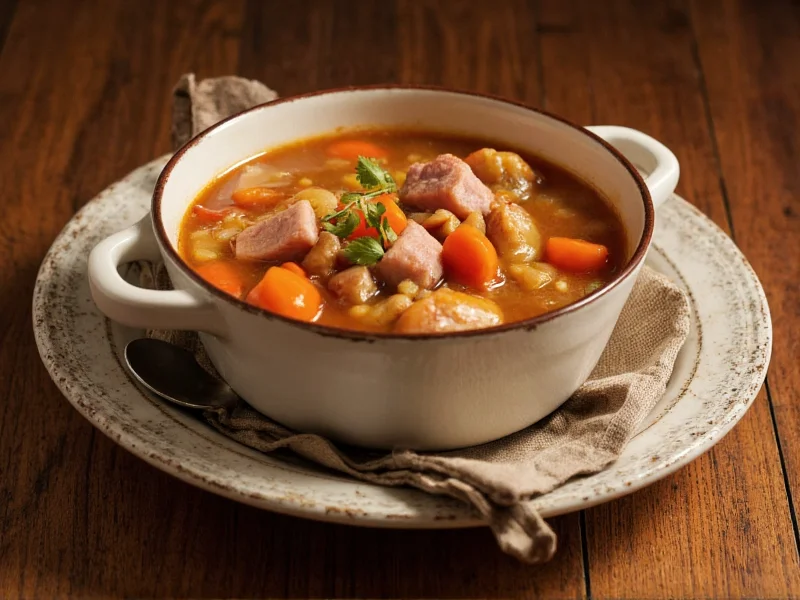For generations, resourceful home cooks have turned humble ham bones into nourishing meals. This time-honored tradition emerged from practicality—using every part of the holiday ham to create something delicious and economical. The resulting soup features a deeply savory broth infused with smoky ham flavor, tender vegetables, and often hearty beans or peas.
The History of Ham Bone Soup
Ham bone soup traces its roots to European peasant cooking traditions where nothing went to waste. American settlers adapted these methods, particularly in Southern cuisine where ham was a staple protein. During lean times like the Great Depression, ham bone soup became essential comfort food—transforming a single ham into multiple meals. The bone's collagen breaks down during simmering, creating a naturally thickened, nutrient-rich broth that was especially valuable before commercial stocks existed.
Essential Ingredients for Authentic Flavor
The magic of traditional ham bone soup comes from quality ingredients working together:
| Ingredient | Traditional Amount | Why It Matters |
|---|---|---|
| Ham bone with meat | 1 large (2-3 cups meat) | Provides smoky depth; choose bone-in ham hock for maximum flavor |
| Yellow onions | 2 medium, diced | Creates aromatic base; traditional in Southern cooking |
| Carrots | 3 large, sliced | Adds natural sweetness; classic mirepoix component |
| Celery | 3 stalks, chopped | Completes flavor base; enhances savory notes |
| Garlic | 3 cloves, minced | Deepens complexity; traditional in many regional variations |
| Dried beans | 1 cup (navy or Great Northern) | Adds heartiness; traditional protein source in old recipes |
Step-by-Step Preparation Guide
Follow these time-tested methods for perfect old fashioned ham bone soup:
Preparation (20 minutes)
- Rinse ham bone under cold water, removing any surface debris
- Soak dried beans overnight in cold water (or use quick-soak method)
- Chop all vegetables to uniform 1/2-inch pieces for even cooking
- Remove any remaining meat from ham bone, reserving for later addition
Cooking Process (2-3 hours)
- Place ham bone in 8-quart pot with 10 cups cold water
- Bring to gentle simmer (not boil) over medium heat
- Add soaked beans and cook 1 hour until beginning to soften
- Add onions, carrots, celery, and garlic; simmer 45 minutes
- Stir in reserved ham meat and cook 15-20 minutes more
- Season with black pepper and apple cider vinegar to taste
Traditional Variations Across Regions
Old fashioned ham bone soup adapts beautifully to regional preferences:
- Midwestern version: Includes corn and potatoes for heartier texture
- Southern adaptation: Features black-eyed peas and a dash of hot sauce
- New England style: Incorporates navy beans and a bay leaf for subtle complexity
- Slow cooker method: Combine all ingredients and cook on low 8 hours
Serving and Storage Tips
For authentic presentation and maximum enjoyment:
- Serve hot with crusty bread or cornbread for dipping
- Garnish with fresh parsley or chives for color contrast
- Refrigerate for up to 5 days—flavors improve overnight
- Freeze in portion-sized containers for up to 3 months
- Reheat gently on stove, adding water if needed for desired consistency
Troubleshooting Common Issues
Even experienced cooks encounter these challenges with traditional ham bone soup:
- Soup too salty: Add peeled potato chunks while simmering to absorb excess salt
- Broth lacking depth: Roast ham bone at 375°F for 20 minutes before simmering
- Vegetables too mushy: Add root vegetables in stages based on cooking time
- Fat separation: Chill soup overnight and remove solidified fat before reheating
Frequently Asked Questions
Can I use a ham hock instead of a ham bone for old fashioned ham bone soup?
Yes, ham hocks work exceptionally well and actually provide more collagen for a richer broth. Simmer for the full 2-3 hours to fully tenderize the connective tissue. Remove the hock after cooking, shred any meat, and return it to the soup.
How long should I simmer old fashioned ham bone soup for best flavor?
For optimal flavor development, simmer old fashioned ham bone soup for 2-3 hours. The first hour develops the broth base, the second hour allows vegetables to soften and flavors to meld, and the final 30 minutes lets the soup thicken naturally. Avoid boiling, which can make the broth cloudy.
What vegetables work best in traditional ham bone soup recipes?
Classic vegetables include onions, carrots, celery, and garlic as the flavor base. Traditional additions are potatoes, green beans, and corn. Avoid watery vegetables like zucchini that break down too quickly. For authentic old fashioned ham bone soup, add root vegetables first and delicate vegetables in the last 30 minutes.
Can I make old fashioned ham bone soup without soaking beans overnight?
Yes, use the quick-soak method: Cover beans with 2 inches of water, bring to boil for 2 minutes, then remove from heat and let stand covered for 1 hour. Drain and proceed with recipe. Alternatively, use canned beans added during the last 30 minutes of cooking, though dried beans provide superior texture in traditional ham bone soup.
How do I prevent old fashioned ham bone soup from becoming too salty?
Start with low-sodium ham if possible, and never add additional salt until the end. If soup becomes too salty during cooking, add a peeled potato chunk and simmer 20 minutes—the potato will absorb excess salt. A splash of apple cider vinegar or lemon juice can also balance salty flavors in traditional ham bone soup recipes.











 浙公网安备
33010002000092号
浙公网安备
33010002000092号 浙B2-20120091-4
浙B2-20120091-4